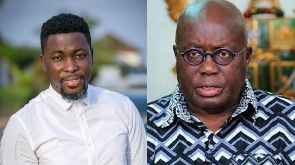- Home - News
- TWI News | TV
- Polls
- Year In Review
- News Archive
- Crime & Punishment
- Politics
- Regional
- Editorial
- Health
- Ghanaians Abroad
- Tabloid
- Africa
- Religion
- Election 2020
- Coronavirus
- News Videos | TV
- Photo Archives
- News Headlines
- Press Release
General News of Friday, 29 December 2000
Source: Reuters -By Kwaku Sakyi-Addo
Early Lead for Opposition's Kufuor
Ghanaians waited on Friday to see who would succeed their charismatic leader Jerry Rawlings after a closely fought presidential run-off pitting his heir apparent against a man he once predicted would never win power.
Provisional results from Thursday's election, drawn from 15 percent of the West African country's 200 constituencies, showed opposition standard bearer John Kufuor moving into an early lead. Turnout was lower than in the December 7 first round.

Kufuor, who came within a whisker of winning the first round outright, led Vice-President John Atta Mills in all but three of the 30 constituencies where election officials had announced results.
Many early results were from Greater Accra, a Kufuor bastion, but some suggested that Mills had lost ground in areas which he won on December 7.
Kufuor accused Rawlings, a former fighter pilot who staged two coups before embracing political and economic reforms, of resorting to intimidation tactics and other irregularities to keep his National Democratic Congress (NDC) in power.
``There are ominous signals that the master coupmaker is in control of this election,'' Kufuor, 63, said in a statement, after earlier accusing soldiers of beating people.
``It's not fair by any measure to molest anyone who has only come to express themselves by voting,'' he said when voting.
But Mills, 56, said that the security forces had been deployed to ensure that order was maintained and that polling was free and fair for all. ``That is what the security and other agencies are there for.''
Rawlings Says He Will Respect Verdict
Rawlings, who hands over power on January 7, has dominated the former British colony for two decades. He is standing down at the age of 53 because of a constitutional clause denying him a third elected term, but he remains leader of the NDC.
He told the nation on Wednesday that he would respect the result and wanted to hand over power ``in the same atmosphere of peace we've grown accustomed to.''
A Kufuor victory would be Ghana's first alternation of power through the ballot box.
Kufuor, runner-up to Rawlings in the last presidential election in 1996, won the December 7 first round with 48.35 percent of votes cast, just short of an outright majority.
At the same time, his New Patriotic Party (NPP) broke the traditional stranglehold on power enjoyed by Rawlings's party, winning 99 of parliament's 200 seats against 92 for the NDC.
After the vote, all five eliminated presidential hopefuls rallied to Kufuor.
Kufuor and Mills, both Christians, named Muslim running mates, acknowledging the delicate ethnic, political and religious balance in the gold- and cocoa-producing country that won independence from Britain in 1957.
Ghana's history since then -- political instability, army rule, bloody purges, socialist central planning, democracy, free-market economic reforms -- mirrors modern Africa's social and political experience.
Just over 60 percent of Ghana's 10.6 million registered voters turned out in the first-round vote.
Kufuor stood to lose most from a low turnout, with his supporters in towns and among students likely to have been in home villages for the year-end holidays and unable to vote.
Denouncing irregularities, he said his representatives had been prevented from monitoring polling in some places.










